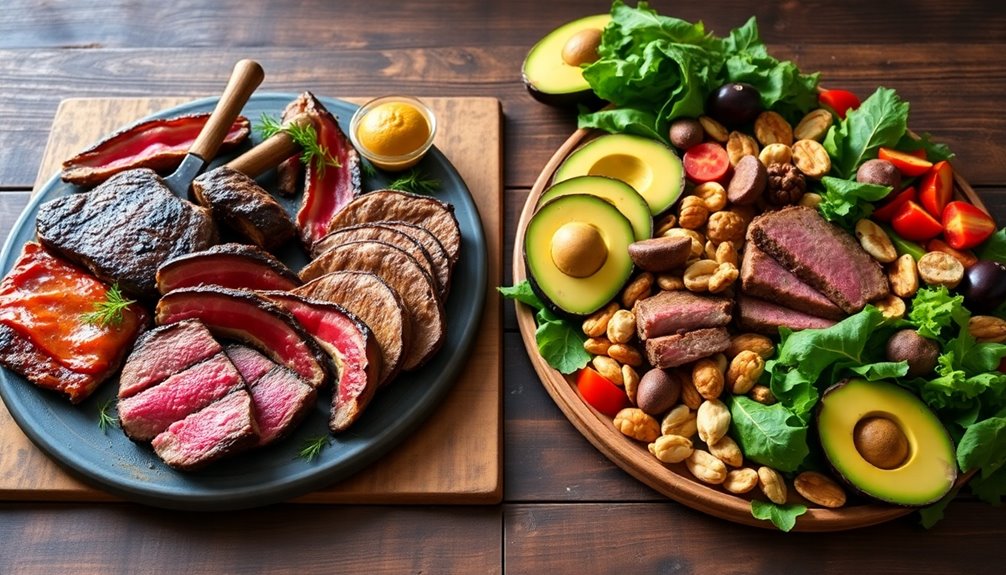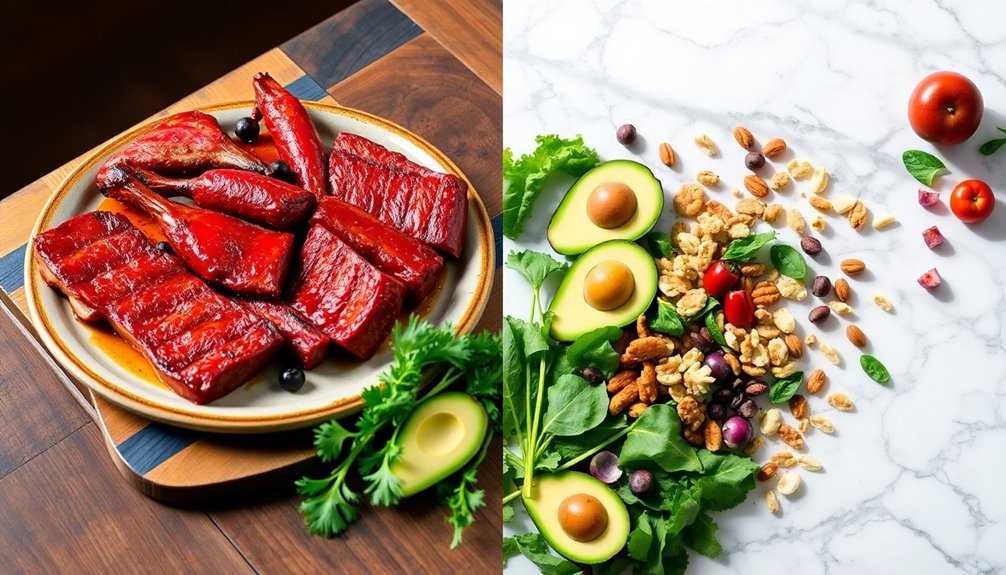The Carnivore Diet focuses exclusively on animal products with zero carbs, while the Keto Diet incorporates high fats and low-carb vegetables. You'll notice that Carnivore simplifies meal planning but lacks variety, whereas Keto offers more food options. Regarding macronutrients, Carnivore emphasizes protein and saturated fats, while Keto balances fats, proteins, and minimal carbs. Both can aid in weight loss and improve blood sugar levels, but their long-term sustainability differs. Each diet has its health benefits and risks, shaping them uniquely to fit your lifestyle. Stick around to explore how these diets align with your health goals.
Overview of Each Diet
When comparing the Carnivore Diet and the Keto Diet, it's essential to understand their fundamental differences.
The Carnivore Diet focuses exclusively on animal products like meat, fish, eggs, and select dairy, leading to a zero-carb intake. This approach emphasizes nutrient-dense foods, claiming to provide peak health by avoiding plant-based foods and potential toxins. Moreover, this diet leads to enhanced fat oxidation, which can help in energy utilization.
In contrast, the Keto Diet is a high-fat, low-carb diet that typically comprises 70-80% fat and allows for some low-carb vegetables and nuts. It promotes a metabolic state of ketosis, where your body uses fat for energy.
While the Carnivore Diet simplifies meal planning, the Keto Diet offers more variety, making it easier for you to adhere to long-term while tracking macronutrient intake for health benefits. Additionally, the Keto Diet has been shown to increase insulin sensitivity, which can further aid in weight management and overall health.
Macronutrient Composition
The macronutrient composition of the Carnivore Diet and the Keto Diet reveals striking differences that cater to distinct dietary preferences.
The Keto Diet typically consists of 70-80% fat, 15-30% protein, and only 5-10% carbohydrates, promoting ketosis for fat burning. This low-carb approach helps improve insulin sensitivity, making it beneficial for those looking to manage blood sugar levels. Additionally, the Keto diet's emphasis on healthy fats has been shown to significantly elevate HDL cholesterol levels, contributing to better heart health.
In contrast, the Carnivore Diet emphasizes high protein intake without a specific macronutrient ratio, resulting in zero carbohydrates. This diet focuses solely on meat, fish, eggs, and some dairy, leading to a high intake of saturated fats and cholesterol.
Meanwhile, the Keto Diet encourages a diverse range of food sources, including low-carb vegetables and healthy fats. Incorporating healthy fat sources into your meals can enhance nutritional balance and support overall health.
Ultimately, your dietary goals will determine which macronutrient composition best supports your lifestyle and health objectives.
Food Choices and Restrictions

When you choose between the Carnivore Diet and Keto, your food options vary considerably.
The Carnivore Diet restricts you to animal products, while Keto allows low-carb veggies and healthy fats from both animals and plants. Incorporating sources of healthy fats such as avocado oil, coconut oil, and grass-fed butter can significantly enhance the nutritional profile of a ketogenic diet. Additionally, the reduced insulin resistance associated with the keto diet can further improve metabolic health. Understanding these choices and their macronutrient ratios can help you decide which diet fits your lifestyle better. Incorporating healthy oils and fats into your meals can enhance the nutritional profile of a ketogenic diet.
Allowed Food Groups
While both the Carnivore Diet and Keto Diet have their distinct food choices and restrictions, they cater to different preferences and nutritional goals.
Here's a breakdown of the allowed food groups:
- Carnivore Diet: Exclusively includes animal products like beef, pork, chicken, fish, eggs, and select dairy. No plant foods allowed.
- Keto Diet: Incorporates low-carb vegetables, nuts, seeds, and some fruits, promoting a balanced intake.
- Macronutrient Focus: Carnivore operates on zero carbs, while Keto emphasizes high fat (70-80%), moderate protein (15-30%), and minimal carbs (5-10%).
- Nutrient Consideration: Carnivore may lead to potential nutrient deficiencies due to the exclusion of plant foods, unlike Keto, which can provide a more balanced nutrient intake when managed properly.
Plant-Based Restrictions
Although you may find the Carnivore Diet appealing for its simplicity, it strictly excludes all plant-based foods, leaving only animal products on the menu.
This zero-carb approach eliminates whole foods that contain essential nutrients and dietary fiber, which can lead to micronutrient deficiencies, particularly in vitamins C and E, typically found in fruits and vegetables.
On the other hand, the Keto Diet offers flexibility in meal planning by allowing limited plant-based foods, such as low-carb vegetables, nuts, and seeds, while managing carb content.
Macronutrient Ratios
Understanding macronutrient ratios is vital when comparing the Carnivore Diet and Keto Diet, as they differ markedly in their food choices and restrictions.
Here's a quick breakdown:
- Keto Diet: 70-80% fat, 15-30% protein, 0-10% carbohydrates.
- Carnivore Diet: Operates on a zero-carb diet, focusing solely on animal products.
- Protein Sources: Keto allows moderate protein from both animal and some plant sources, while Carnivore prioritizes high protein exclusively from animal products.
- Carbohydrate Intake: Keto permits a small percentage of carbs, primarily from non-starchy vegetables, unlike the Carnivore Diet that eliminates all carbs.
With the Keto Diet, tracking daily macronutrient goals is essential for maintaining ketosis, while the Carnivore Diet focuses on satisfaction without strict intake guidelines.
Health Benefits
When you explore the health benefits of the Carnivore and Keto diets, you'll find both offer unique advantages that can enhance your well-being.
The Carnivore diet promotes significant weight loss through high protein intake, while the Keto diet helps you achieve a fat-burning metabolic state via ketosis.
Both diets improve blood sugar regulation by reducing carb intake, leading to better health outcomes. You'll likely experience enhanced mental clarity on either diet, thanks to increased energy from fat metabolism. Additionally, the ketogenic diet can lead to increased fat burning, which further supports weight loss efforts and metabolic health. Furthermore, the Keto diet has been shown to significantly reduce triglyceride levels, benefiting cardiovascular health. Studies have also indicated that the Keto diet can lead to a reduction in inflammation, further promoting overall health.
While the Keto diet shows promise in improving heart health markers, the Carnivore diet's effects on heart health remain less established.
Additionally, both diets contribute to inflammatory reduction by eliminating processed foods, further supporting your overall wellness.
Potential Risks

When you're considering the Carnivore or Keto diet, it's essential to be aware of potential risks like nutrient deficiencies and long-term health concerns. Both diets limit food variety, which can lead to a lack of essential vitamins and minerals. Plus, high consumption of red meat or drastic carb reduction might raise red flags for your overall health. Additionally, chronic inflammation can be exacerbated by the exclusion of diverse food sources that provide anti-inflammatory nutrients. The ketogenic diet, however, has been shown to reduce inflammation through various mechanisms, potentially offering benefits for those who experience inflammatory conditions. Furthermore, the Keto Diet emphasizes inflammation-fighting foods that can help mitigate these risks and support overall health.
Nutrient Deficiency Risks
Nutrient deficiency risks loom large for both the Carnivore and Keto diets, each presenting unique challenges. Here are some key concerns you should consider:
- Vitamins: The Carnivore Diet can lead to deficiencies in vitamins C and E due to the lack of plant-based foods.
- Minerals: Keto may result in low magnesium and potassium levels if your meal plans aren't well-balanced.
- Fiber: Both diets often lack adequate fiber, essential for gut health, leading to digestive issues.
- Antioxidants: Long-term adherence to the Carnivore Diet raises concerns about missing out on antioxidants and phytochemicals from fruits and vegetables.
Be mindful of these nutrient deficiencies to guarantee you're meeting your dietary needs effectively!
Long-term Health Concerns
While both the Carnivore and Keto diets promise weight loss and improved health markers, long-term adherence can raise significant health concerns.
The Carnivore diet eliminates all plant-based foods, leading to potential micronutrient deficiencies, particularly in vitamins C and E. Additionally, its high saturated fat content and low fiber consumption may increase risks for chronic diseases.
The Keto diet, while effective for weight loss, can also pose long-term risks like kidney stones and osteoporosis if not managed carefully.
Both diets may result in digestive issues, including constipation for Carnivore dieters and gastrointestinal disturbances for those on Keto.
Ongoing research is necessary to fully understand the long-term health impacts of each diet and their sustainable challenges.
Meal Planning Ease
Meal planning can be a breeze with the Carnivore Diet, as it revolves solely around animal products, which eliminates the hassle of tracking macronutrients or hunting for complex recipes.
Here are some key points to reflect on:
- Simplicity: With fewer meal options, you can easily adhere to your plan without stress.
- High Protein Intake: The satiating nature of the Carnivore Diet reduces the urge for snacking.
- Less Frequency: You typically enjoy longer periods between meals compared to the Keto Diet.
- No Complicated Ratios: Unlike the Keto Diet, which requires careful tracking of 70-80% fat, you can focus solely on meat.
Additionally, high-protein dishes from the Keto diet can offer inspiration for meal variety within the Carnivore framework.
In essence, the Carnivore Diet streamlines meal planning and enhances adherence, making it a straightforward choice.
Weight Loss Effectiveness

When it comes to weight loss effectiveness, both the Carnivore and Keto diets can deliver results, especially in the short term.
You might notice rapid initial weight loss on the Keto diet due to ketosis, while the Carnivore diet focuses on high protein intake to keep you feeling full.
However, considering long-term sustainability, Keto's flexible food choices may help you stick with it more easily over time.
Rapid Initial Weight Loss
Both the Carnivore Diet and Keto Diet can kickstart your weight loss journey rapidly, often leading to noticeable results within just a few weeks.
Here's how they promote rapid initial weight loss:
- Reduced Carbohydrate Intake: Both diets considerably lower carb consumption, leading to quick water weight loss.
- Increased Satiety: The Carnivore Diet's high protein intake helps you feel full, reducing overall calorie consumption.
- Ketosis: The Keto Diet shifts your body into ketosis, where it burns fat for energy, aiding weight loss.
- Reduced Insulin Levels: Both diets can lower insulin levels, enhancing fat oxidation and contributing to weight loss.
#
Long-term Sustainability
Factors
While the allure of rapid weight loss can be tempting, the long-term sustainability of a diet is essential for lasting success.
The Carnivore diet aims for quick results through strict dietary restrictions, but this can lead to cravings and nutrient deficiencies over time.
In contrast, the Keto diet promotes weight loss by inducing ketosis, allowing more flexibility in food choices, which helps prevent feelings of deprivation.
Studies suggest you may lose more weight on Keto compared to low-fat diets, making it easier to maintain your results long-term.
## Long-term Sustainability
Although the Carnivore diet promises rapid results, its long-term sustainability is often questionable.
Here's why the Keto diet is generally considered more sustainable:
- Food Choices: Keto allows a variety of foods, including low-carb vegetables and nuts, which helps meet nutritional needs.
- Meal Variety: The diverse range of permitted foods in Keto encourages enjoyment and reduces monotony.
- Adherence: Studies show people on Keto are more likely to stick to their diet due to its flexibility.
- Nutritional Balance: The focus on macronutrient tracking in Keto fosters awareness of overall health outcomes.
In contrast, the Carnivore diet's restrictive nature can lead to micronutrient deficiencies and challenges in maintaining long-term adherence, making it less sustainable overall.
Community Support and Resources

Community support plays an essential role in steering through the challenges of both the Carnivore and Keto diets. For the Carnivore Diet, you'll find online forums and social media groups where members share meal planning tips, advice, and success stories to help newcomers navigate the strict guidelines. Resources mainly focus on acceptable animal products and their nutritional benefits.
In contrast, the Keto Diet community offers a broader range of resources, including recipe books, meal planning tools, and apps that help track your macronutrient intake. Both communities foster accountability and motivation, with participants sharing challenges and triumphs.
You'll also find valuable insights through podcasts, YouTube channels, and blogs, featuring expert interviews to enhance your understanding and adherence to your chosen diet plan.
Personalization and Flexibility
When it comes to dietary choices, personalization and flexibility are essential for maintaining long-term adherence and satisfaction. The Carnivore Diet's restrictive nature limits your ability to tailor your meals to your specific needs.
In contrast, the Keto Diet allows you to:
- Adjust macronutrient ratios to meet your dietary goals.
- Incorporate low-carb vegetables for nutrient diversity.
- Experiment with various food combinations to keep meals interesting.
- Plan meals that align with your health objectives while enjoying sustainable choices.
This flexibility not only enhances your experience but also makes it easier to stick with the diet over time.
Conclusion
In the end, choosing between the carnivore diet and keto is like picking your favorite flavor of ice cream—except one's all-meat and the other's got a bit of everything. Who knew you could crave bacon and butter so intensely? While both diets promise weight loss and health benefits, the real challenge lies in sticking to them without turning your meals into a never-ending food fight. So, go ahead, pick your poison and enjoy the delicious irony of it all!

